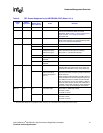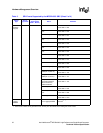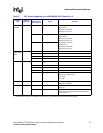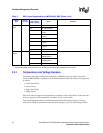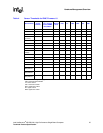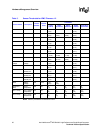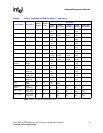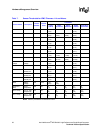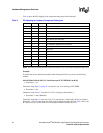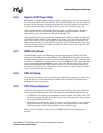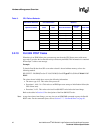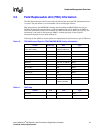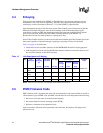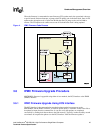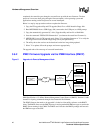
Intel NetStructure
®
MPCBL0001 High Performance Single Board Computer 39
Technical Product Specification
Hardware Management Overview
3.2.2 Processor Events
The processor asserts IERR as the result of an internal error. A thermal trip error indicates the
processor junction temperature has reached a level where permanent silicon damage may occur.
Upon THERMTRIP assertion, the IPMC powers down the boards.
3.2.3 DIMM Memory Events
The MCH (E7501) instructs the ICH3 to report memory parity errors via SMI#. The SMI handler
extracts the error information (address) from the DRAM error registers in the MCH and logs it into
the SEL. The KCS interface performs error reporting to IPMC. BIOS sends a platform event
message with the appropriate data to the IPMC, which logs the event to SEL and forwards the
event to the Shelf Manager. Correctable memory errors generate an SMI and are logged into SEL.
Normally, a board with non-correctable errors is likely to hang as the multi-bit error may cause the
CPU to execute corrupted instructions. If the CPU executes corrupted instructions before executing
the code to log the event, then this event will not be logged in the SEL.
3.2.4 System Firmware Progress (POST Error)
The BIOS is able to log both POST and critical events to the IPMC error log. (Refer to Table 83,
“BIOS Error Messages” on page 127.)
3.2.5 Critical Interrupts
In general, the system BIOS is capable of generating requests on the KCS interface to
communicate with the IPMC for error logging, fault resilience, critical interrupts and reading/
writing inventory CPUs and RAM information to the IPMC. Two LPC interfaces are available for
the BIOS to communicate to the IPMC. The BIOS uses the SMS interface for normal
communication with the IPMC and the SMM interface when executing code under SMM mode.
PCI errors implemented in the MPCBL0001 are handled as follows:
1. The MCH(E7501) sends a parity error/system error (PERR/SERR) message over the hub
interface to the ICH3 notifying it that an error occurred.
2. The ICH3 generates an SMI# interrupt when it receives a PERR/SERR message.
3. The SMI handler checks the error status registers of CPU/MCH until it identifies the source
and type of the error.
4. The handler sends a message to the IPMC via the KCS interface, causing it to log the error in
the IPMC’s event log. IPMC then forwards the event to Shelf Manager to log it into Shelf
Manager SEL.



